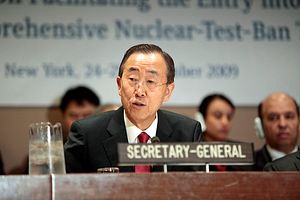Former U.N. Secretary-General Ban Ki-moon urged the world body and Southeast Asian countries Monday to take swift and strong action to stop the deadly crackdown that has followed the military coup in Myanmar, saying he had tried unsuccessfully to make a diplomatic visit himself.
Ban exhorted the U.N. Security Council to act immediately to halt the violence and protect civilians, “using a range of tools at the council’s disposal.” His remarks came weeks after the group toned down a statement on Myanmar by changing a draft that suggested sanctions might be considered.
Chiding that international groups’ commitments to avoiding interference in domestic affairs are no excuse for “inaction in the face of serious human rights abuses,” Ban said the Association of Southeast Asian Nations (ASEAN) — which is holding a summit on Myanmar this month — should at least agree to send a high-level delegation to Myanmar. He also pressed current U.N. Secretary General Antonio Guterres to engage directly with the country’s military.
“The United Nations and its regional partners now have a fleeting window to cooperate through strong action to halt the ongoing atrocities in Myanmar and prevent a further escalation of violence,” Ban said at a virtual Security Council meeting about the U.N.’s work with various regional organizations around the world.
Since Myanmar’s military seized power in February, security forces have killed over 700 protesters and bystanders, according to the Assistance Association for Political Prisoners, which monitors casualties and arrests. The group says more than 3,100 people have been detained; among them are ousted civilian leader Aung San Suu Kyi and President Win Myint.
The violent clampdown continued Monday as government forces confronted demonstrators who sought to celebrate last week’s formation of a shadow government by opponents of the junta.
The coup reversed a slow movement toward democracy in recent years in Myanmar, where five decades of strict military rule had led to international isolation and sanctions. The generals eventually loosened their grip, culminating in Aung San Suu Kyi’s rise to leadership in 2015 elections. The international community responded by lifting most sanctions and pouring investment into the country.
While secretary-general from 2007 to 2016, Ban went to Myanmar to press the country’s then-ruling generals to let an unimpeded influx of foreign aid and experts reach survivors of 2008’s Cyclone Nargis, which killed an estimated 134,000 people. He also urged the military to embrace democracy.
He said Monday that he recently asked to make another visit, aiming to meet with all the parties involved to try to de-escalate their conflict and foster dialogue. Authorities told him such a visit “will not be convenient at this moment,” he said.
A message was sent Monday to Myanmar’s U.N. mission seeking comment on Ban’s remarks and the Security Council’s discussion.
The council has strongly condemned the violence against peaceful protesters and has called for a reversal of the coup, the immediate release of government leaders, and “utmost restraint” by the military. But a draft of an April 1 statement was softened — partly by removing a phrase saying the council could “consider further steps,” which could mean sanctions — because of objections from China, Myanmar’s neighbor and friend.
Chinese Foreign Minister Wang Yi told the council Monday that it should look to the Southeast Asian nations group — ASEAN, for short — on Myanmar.
“Supporting ASEAN’s constructive participation in Myanmar’s domestic reconciliation process in an ASEAN way and de-escalating tension in Myanmar serves the interests of the people of Myanmar and the international community,” said Wang, who has sounded similar notes before.
Several other council members also said they were keenly awaiting the outcome of the ASEAN summit.
ASEAN wants to see “all parties concerned seek a peaceful solution and pursue constructive dialogue, reconciliation and a return to normalcy in accordance with the will and interests of the people of Myanmar” and is ready to help, said Dato Erywan Pehin Yusof, the second foreign minister of current ASEAN chair Brunei.
Guterres called ASEAN’s role “crucial” and called for “a robust international response grounded on a unified regional effort.”
As for the U.N.’s part, he noted that his Myanmar envoy is in the region and ready to talk with the military and others.

































